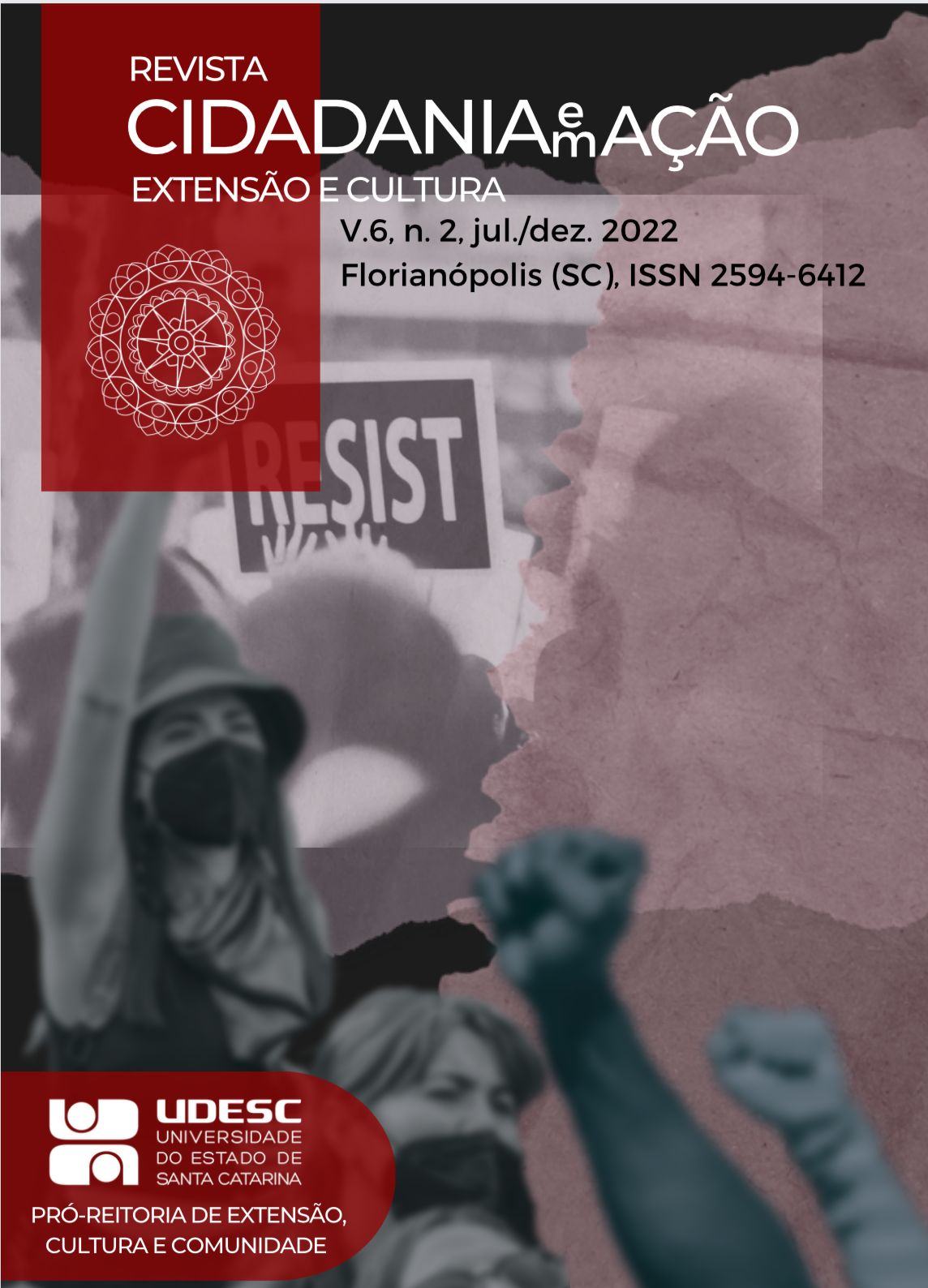A love for the earth: stories and experiences of the Beira Rio camp
DOI:
https://doi.org/10.5965/cidea.v6i2.22264Keywords:
natural resources, environment, video documentaryAbstract
In general, the project proposed the production of a video-documentary with testimonials of the residents of the Beira Rio Camp, in the city of Fronteira, in the state of Minas Gerais, which would bring an approach to their relations with natural resources and with the land, where the camp is. The learnings in school, the knowledge in everyday experiences, family experience, deterritorializations, among many other factors related to life in the field. It was also specifically aimed at verifying the changes that have occurred in the camp since the arrival of family farming, and the role of this model in the transformations of the site. And, finally, to have an overview of the natural resources used in production, to understand the expectations of residents on the more sustainable use of these resources. The testimonies were recorded, from a guide of questions, to facilitate the post-production process. The recordings made allowed to build a documentary with 34 minutes, which is being shown in schools in the region. Bringing the stories of the campers, and love they show for the land, to other audiences is an effective way to combat prejudice and misinformation on the members of the struggle for land movements. It is believed that the documentary "A love for the land" has fulfilled this function.
Downloads
References
ALIER, Juan Martinez. O ecologismo dos pobres. Raega: O Espaço Geográfico em Análise, [S.l.], v. 1, dec. 1997.
ALMEIDA, José. Som e imagem. São Paulo: Cortez, 1994.
ALTIERI, M. Agroecologia: a dinâmica produtiva da agricultura sustentável. 4. ed. Porto Alegre: Editora da UFRGS. 2004. 117 p.
ARONOVICH, Ricardo. Expor uma história: a fotografia do cinema. Rio de Janeiro: Gryphus; São Paulo: ABC, 2004.
BERGAMASCO, S. M. P. P. (org.). Agricultura Familiar Brasileira: Desafios e Perspectivas de Futuro. Brasília: Secretaria Especial de Agricultura Familiar e do Desenvolvimento Agrário, 2017. p. 197-222.
BRANDENBURG, A. Ecologização da agricultura familiar e ruralidade. In: DELGADO, G. C.; BERGAMASCO, S. M. P. P. (org.). Agricultura Familiar Brasileira: Desafios e Perspectivas de Futuro. Brasília: Secretaria Especial de Agricultura Familiar e do Desenvolvimento Agrário, 2017. p. 152-.167.
CASTRO, L. F. P. Agricultura familiar, habitus e acesso à terra. Rev. Bras. Soc. Direito, 2 (2), 2015, p. 91-105.
COSTA, F. L. M, RALISCH, R. A juventude rural do assentamento Florestan Fernandes no município de Florestópolis (PR). RESR, 51 (3), 2013, p. 415-432.
DURAN, J. J. Iluminação para vídeo e cinema. São Paulo, Press Print, 1994.
FARIZA, I. É preciso apagar a ideia de que reduzir a desigualdade é coisa de comunista. El País, Cidade do México, ano 44, 05 ago. 2019. Disponível em: https://brasil.elpais.com/brasil/2019/08/02/economia/1564739067_996880.html.
GARCIA CANCLINI, N. Leitores, espectadores e internautas. São Paulo: Iluminuras, 2008.
GLIESSMAN, S.R. Agroecologia: processos ecológicos em agricultura sustentável. Porto Alegre: Ed. UFRGS, 2005, 652p.
MAZALLA, W. N.; BERGAMASCO. S. M. P. P. A experiência agroecológica e o fortalecimento da racionalidade camponesa na relação com a natureza. In: DELGADO, G. C.; MELO, C. T. V. O documentário como gênero audiovisual. Comunicação & Informação, [S. l.], v. 5, n. 1/2, p. 25–40, 2013.
NICHOLS, B. Introdução ao Documentário. 5ª ed. Campinas: Papirus 2010.
PORTO, J.R.S. O discurso do agronegócio: modernidade, poder e “verdade”. Rev. NERA, 17 (25), 2014, p. 24-46.
ALLES, J. M. A dificuldade do documentário. In: MARTINS, J. S.; ECKERT, C.; CAIUBY NOVAES, S. (org.). O imaginário e o poético nas ciências sociais. Bauru: Edusc, 2005, p.57-71.
ZAN VIEIRA, F.; ROSSO, A. J. O cinema como componente didático da educação ambiental. Revista Diálogo Educacional, [S.l.], v. 11, n. 33, p. 547-572, jul. 2011.
Downloads
Published
How to Cite
Issue
Section
Categories
License
Copyright (c) 2022 Citizenship in Action: Extension and Culture Magazine

This work is licensed under a Creative Commons Attribution 4.0 International License.












